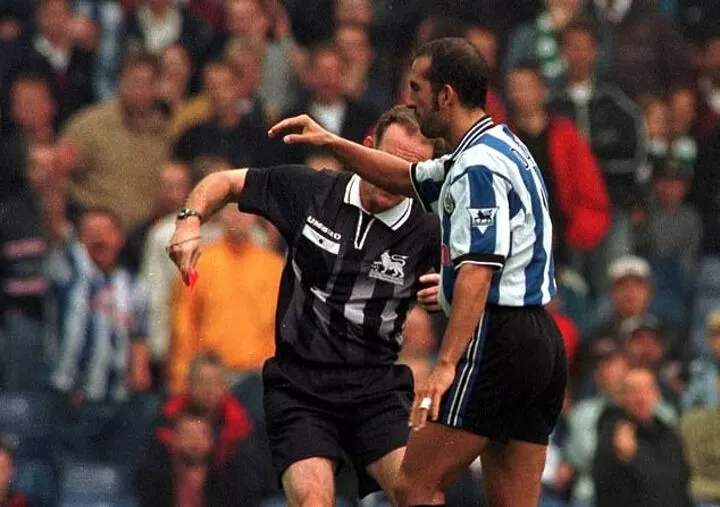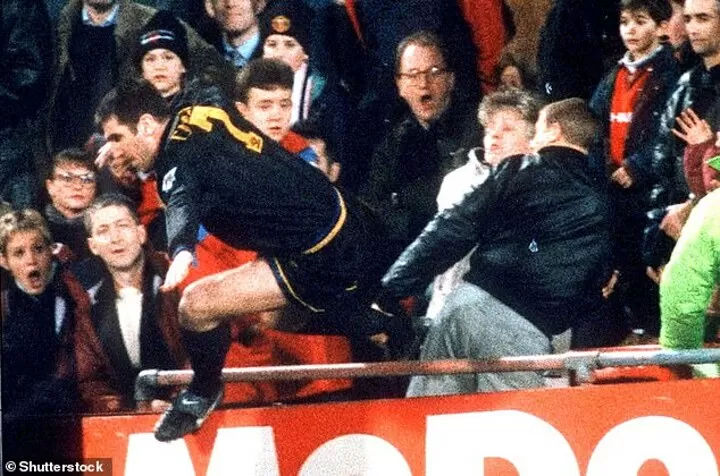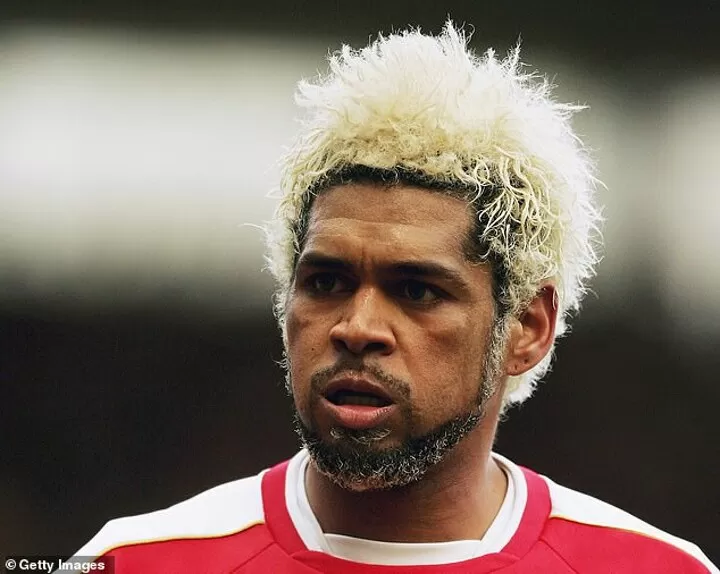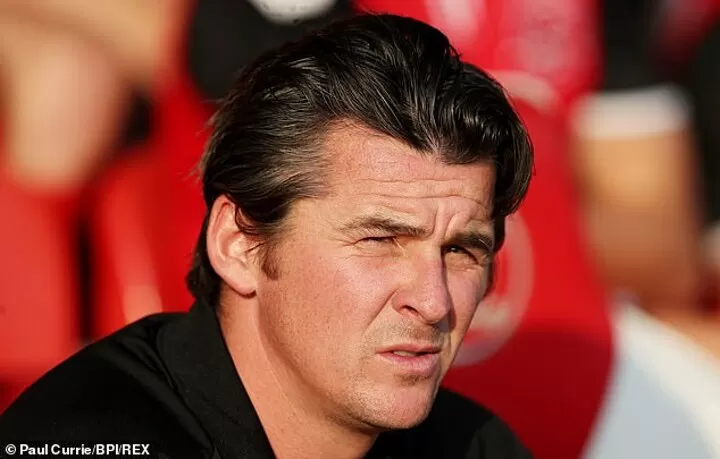Ivan Toney has been suspended from football for eight months after admitting to 232 breaches of rules against betting on the game.
The Brentford and England striker will play no part in football until January 2024, and has even been banned from training with the Bees until September.
By missing two-thirds of a calendar year, Toney will serve one of football’s sternest punishments for breaking the rules – although others have served longer on the sidelines for their indiscretions.
From drugs to gambling to violent conduct, there have been a vast number of reasons why some players have missed months of the beautiful game.
Here are some of the players to have served the longest bans issued in the Premier League era.
Aleksandar Mitrovic (Fulham) / Ben Thatcher (Man City) – 8 games
This season has already seen one of the longest bans issued to a player.
Fulham’s Aleksandar Mitrovic was banned for eight games after shoving referee Chris Kavanagh during their FA Cup defeat to Manchester United in March.
The FA were even thought to have wanted a longer suspension for the ugly incident, although it has since passed, and he has returned to Fulham’s team.
The Serbian striker is not the only man to have received an eight game ban. Manchester City’s Ben Thatcher received the same punishment for elbowing Portsmouth’s Pedro Mendes unconscious in a game in September 2006.
Thatcher was only booked for the incident at the time, but the FA issued the ban after choosing to take further action post-match. Man City also fined him six week’s wages for the incident.


Luis Suarez (Liverpool) / David Prutton (Southampton) – 10 games
Luis Suarez also received an eight-game ban after a hearing by the FA ruled that the controversial Uruguayan had racially abused Manchester United’s Patrice Evra.
It wasn’t even his longest single punishment, which was a ten-game disciplinary issued after accepting a violent conduct charge for biting Chelsea’s Branislav Ivanovic on the arm, in an incident the on-field officials missed at the time.
A three-man independent panel criticised Suarez for not appreciating ‘the seriousness’ of the incident – the second of three biting incidents which have marred Suarez’s career.
Southampton’s David Prutton was also given a ten-match suspension for pushing the referee, following a late studs-up challenge on Arsenal’s Robert Pires, which saw him sent off for a second bookable offence.
Prutton, who now works as a Sky Sports commentator, later acknowledged he had made a mistake, and was fined £6,000 by the FA for his misdemeanour.


Paolo Di Canio (Sheffield Wednesday) – 11 games
The most famous incident of a player in the Premier League clashing with a referee came when the fiery Paolo Di Canio shoved Paul Alcock following a red card incident against Arsenal.
It turned out to be the Italian’s last game for Sheffield Wednesday, before joining West Ham, and the angry reaction towards Alcock earned Di Canio a £10-000 fine as well as 11 games on the sidelines.

Adrian Mutu (Chelsea) – 7 months
As the offences become more egregious, the punishments move from a distinct number of games to an issue of time out of the game.
Chelsea’s striker Adrian Mutu was released from his contract in October 2004 after testing positive for cocaine, and received a seven-month ban for taking recreational drugs – which crossed over to Juventus when he switched clubs.
The FA fined him £20,000 for the failed drugs test – and the Romanian was then involved in a long legal battle over claims he owed Chelsea £15.2m.
In 2018, the European Court of Human Rights rejected Mutu’s appeal against a Court of Arbitration’s decision three years earlier, insisting he had to solely pay the compensation to Chelsea.

Ivan Toney (Brentford) and Rio Ferdinand (Man United) – 8 months
Ivan Toney’s eight-month suspension for breaching 232 betting rules is a huge blow for the Brentford striker after a great season for the Bees.
An independent disciplinary commission imposed an eight-month suspension and a £50,000 fine on the England striker following a hearing this week.
The FA are set to apply to make the ban apply worldwide, which would stop him from training with another club, or playing again before January 2024.
Toney is not the only England player to serve an eight-month absence from football. Rio Ferdinand suffered a similar fate in December 2003, after missing a drugs test scheduled for the end of his training session at Carrington.
An appeal failed, and the Man United defender was forced to sit out the rest of the domestic season, as well as England’s Euro 2004 campaign which saw them eliminated at the quarter-final stage to eventual runners-up Portugal.


Eric Cantona (Man United) and Mark Bosnich (Chelsea) – 9 months
Eric Cantona kung-fu kicked a Crystal Palace fan after being sent off at Selhurst Park in 1995, in what has become one of the most memorable incidents in football history.
The Frenchman admitted a criminal assault charge, for which he was sentenced to community service, and he received a £30,000 fine and a ban, which was eventually extended to nine months.
Cantona’s absence was a massive blow for Sir Alex Ferguson’s side as Blackburn Rovers won the title that year ahead of Man United.
Chelsea’s Australian goalkeeper Mark Bosnich was also given a nine-month suspension in April 2003, for failing a drugs test after taking cocaine.
Bosnich tried to appeal the ban, and failed, and was fired by the Blues as a result, just a year after joining from Manchester United.
After overcoming his cocaine addiction, Bosnich returned to football in 2008 when he played for the Central Coast Mariners in Gosford, Australia.


Abel Xavier (Middlesbrough) – 12 months
Portugal defender Abel Xavier was given an 18-month ban by UEFA in November 2006 after testing positive for an anabolic steroid following a game in the UEFA Cup for Middlesbrough.
The punishment was reduced in the summer of 2006 by the Court of Arbitration for Sport, after claiming that the substance came from anti-virus medicine that he had imported from the USA.
Middlesbrough stuck by Xavier through the incident, and he resumed playing for the north-east club the following season.

Joey Barton (Burnley) – 13 months
The reduction in Abel Xavier’s punishment means that the longest single punishment for a player in the Premier League era was handed to Joey Barton.
Barton was banned for 12 games after elbowing Carlos Tevez in the head during QPR’s final-day decider against Manchester City in 2012, and while he was sent off, the volatile character then kicked Sergio Aguero in the back of the leg, attempted to headbutt Vincent Kompany and had to be held back from squaring up to Mario Balotelli as he walked off the pitch.
Barton was suspended for 12 games as a result of his actions at the Etihad that day, and fined £75,000 by the FA, as well as six-weeks wages by QPR.
In April 2017, Barton, who was now playing for Burnley, was suspended for 18 months for placing bets on 1,260 matches between March 2006 and May 2013.
After being released by the Clarets, the midfielder had his suspension reduced on appeal by five months, although the 13-month ban remains the longest single punishment served by a player.


And in the pre-Premier League era, spare a thought for Manchester United’s Enoch West.
The centre-forward was part of a match-fixing scam in 1915 between the Red Devils and Liverpool. West was banned for life by The FA, alongside several Liverpool players.
But while the Reds’ players had their punishments quashed after the First World War, West’s life-long banishment from football remained.
It was eventually lifted in 1945, but at the age of 59, he played no further role in football. But the 30-year ban will probably forever be the longest ban in English top-flight history.
